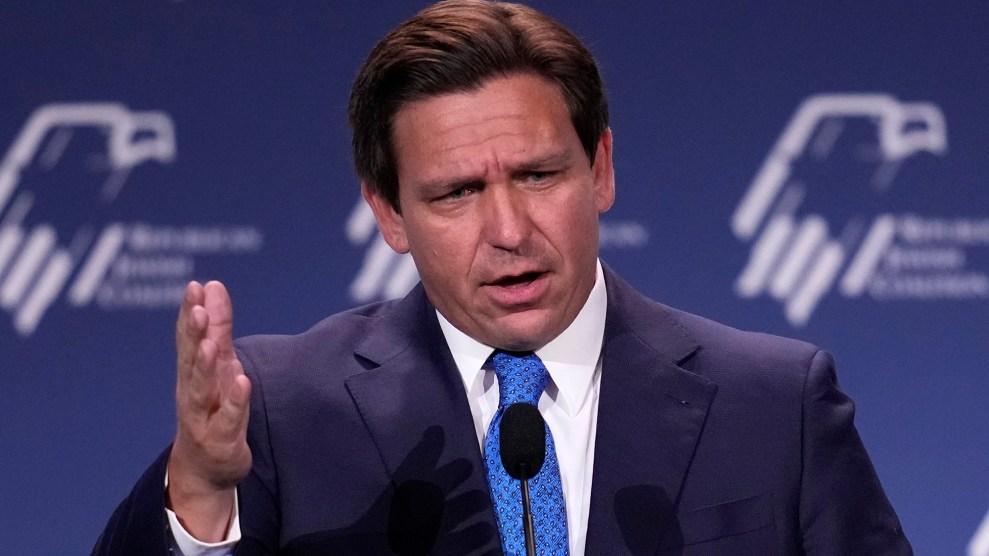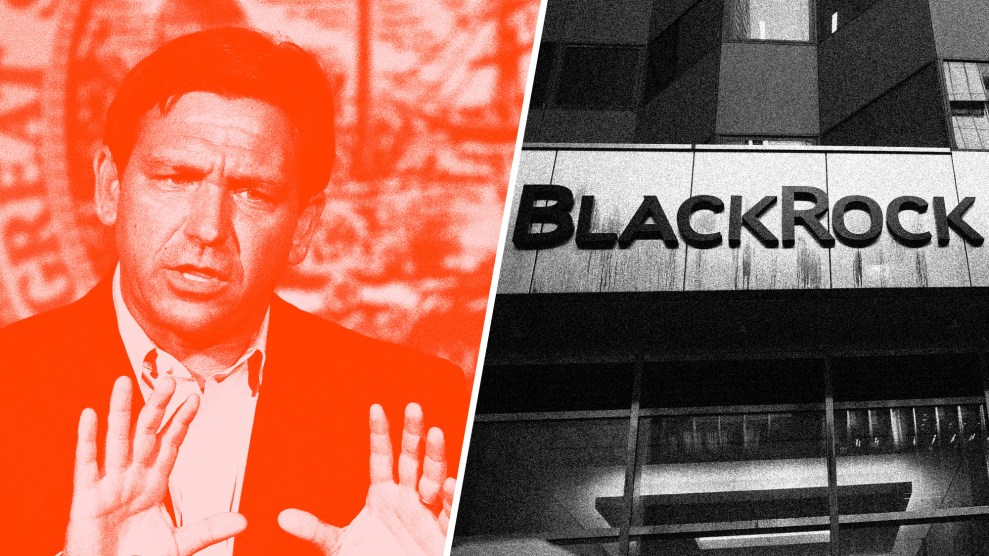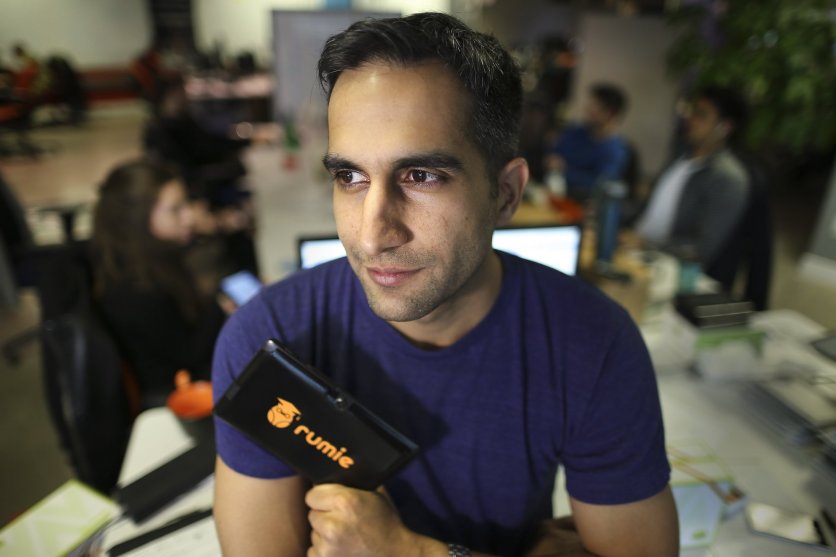When the US targeted Russia’s oligarchs after the invasion of Ukraine, the trail of assets kept leading to our own backyard. Not only had our nation become a haven for shady foreign money, but we were also incubating a familiar class of yacht-owning, industry-dominating, resource-extracting billionaires. In the January + February 2024 issue of our magazine, we investigate the rise of American Oligarchy—and what it means for the rest of us. You can read all the pieces here.
In August 2022, a dozen or so businessmen crowded onto the balcony that looms above the trading floor of the New York Stock Exchange. As the clock neared 4 p.m., the group from Strive Asset Management waved, clapped, and flashed toothy smiles, waiting to ring the closing bell. They were a sea of navy suits.
They were celebrating the start of trading for their firm’s first financial product—an exchange-traded fund titled $DRLL. Stuffed full of companies like Exxon and Chevron, $DRLL (yes, “drill”) was a way for people to invest more in fossil fuels. Strive’s reasoning for such a product comes from a sort of free-market purism: The only goal of a business should be to earn the greatest returns possible—climate-fueled collapse be damned. “Strive is mandating US energy companies to produce more oil & gas without apologizing for it,” the firm declared on Instagram.
Strive aimed to change the way Wall Street does business. In recent years, top asset management firms from BlackRock to Vanguard have expanded what’s known as Environmental, Social, and Governance (ESG) investing—a way to screen investments not just for profit potential, but also for a company’s record on everything from climate change to workplace diversity. Strive’s goal, however, is the exact opposite: to undo what the fund’s leaders see as a growing culture of “wokeness” that has infected boardrooms across America.
Strive had emerged just three months earlier when its co-founders, ex-Anheuser-Busch executive Anson Frericks and biotech billionaire Vivek Ramaswamy—recently a candidate for the Republican presidential nomination—raised $20 million from several investment firm CEOs and, most prominently, PayPal co-founder Peter Thiel. Thiel, who’d previously worked with Ramaswamy on at least one other venture, showed particular enthusiasm for the firm’s mission: He invested personally, his Founders Fund joined in with a separate investment, and another Thiel-backed venture capital firm—run by author turned GOP Sen. J.D. Vance—also contributed. Now, smashing a symbolic gavel above the epicenter of American finance, Ramaswamy and his team had reached a key moment of public recognition. Within a month, the firm’s bet on anti-ESG investing seemed to be paying off: Strive boasted more than $300 million invested in $DRLL and received wall-to-wall coverage in the financial press of its success.
To help push its alternative to ESG, the firm has relied heavily on the wheels of government. Targeting primarily red states, Strive has encouraged state pension boards to funnel public employee retirement savings into its fund; met with financial officials in pursuit of state contracts; and spurred Republican politicians to support policies prohibiting states from including ESG considerations when investing billions in public money—helping to create an ideal environment to gain clients for their allegedly nonpolitical mission.
Meanwhile, deep-pocketed Republican influencers—including Thiel and Leonard Leo, the Federalist Society co-chair famous for spearheading the effort to stack courts with ultra-conservative judges—have helped boost the firm by making ESG a new culture war battleground and by propping up Ramaswamy, whose presidential campaign leaned heavily on his “anti-woke” bona fides. Strive says it wants to get politics out of business, but as its powerful backers push a vision of a retrograde, tradition-bound America, its work couldn’t be more political.
Let’s get one thing out of the way: ESG investing is far from perfect. It represents a pittance compared to the trillions in investment needed to stem climate change—only about 14 percent of global assets under management were invested in ESG products as of 2021. And ratings to measure what makes a “good” ESG investment aren’t standardized, which has enabled many a powerful firm to inflate the impact of their ESG funds, boosting their reputations while barely furthering environmental goals. Saudi Aramco, the world’s biggest oil company, even managed to raise billions from bonds contained in various ESG portfolios.
But despite its flaws, ESG is still probably the best available way to help measure the ethical and social behaviors of a company. There’s also the simple fact that ESG investing has proved to be profitable. “I want to know what the long-term impacts are of climate on a company. I want to incorporate that in my investment decision. That’s not political. That’s just good business,” says Witold Henisz, the director of the ESG initiative at the University of Pennsylvania’s Wharton School of Business. “I’m not saying this is the morally right thing to do. I’m saying let’s look at the impact on revenues, on costs, on productivity.”
For Strive’s backers, the finer points of that argument seem irrelevant. The company has helped advance an anti-ESG push that is resonating with Republican voters. It also signals something broader and more troubling: an effort to undo a healthier, safer, and more equal future. ESG has allowed values like social responsibility and inclusivity to tiptoe into the halls of American business, all while Thiel, Leo, and their ilk have worked to manufacture the opposite: a politics that shuns drag shows, Black history books, and reproductive health care. Their goal is to maintain the systems that feed the American oligarchy, which means muzzling those who dare to suggest, with their words or their dollars, that those structures were never good for us in the first place. (Neither Thiel nor Leo responded to requests for comment.)
The work of this influential circle has often happened in public—through ad campaigns, public appearances, and the press. Meanwhile, Strive has operated mostly in private: over meals, at roundtables, and in presentations to powerful state officials. But, together, it represents a concerted attempt to convince American voters that their money is being frittered away on liberal priorities by coastal corporate elites.
In the summer of 2022, for example, Ramaswamy spoke to a meeting of Missouri’s pension board, which manages the investment of $8.4 billion in state employee retirement funds. The following day, the board moved to instruct BlackRock—the world’s largest asset manager, famous for its commitment to ESG investing—to stop voting on Missouri’s behalf to push ESG goals within the companies where the state’s funds are invested, a practice called “proxy voting.”
Over the next few months, Strive’s top brass spoke with financial officials and pension fund managers in eight more red-leaning states, according to records obtained by the investigative outlet Documented. In Utah, Ramaswamy and State Treasurer Marlo Oaks were on an email chain in June 2022 about Strive’s anti-ESG offerings. Within days, Oaks appeared on Tucker Carlson’s Fox News show decrying ESG—earning a congratulatory email from the president of the right-wing Heritage Foundation. A couple of months later, Oaks pulled about $100 million of state funds from BlackRock in protest, after blasting ESG metrics as “left-wing.” Not long after, the South Carolina treasurer invited Ramaswamy to meet with his investment staff and soon announced the state’s final $200 million divestment from BlackRock over its “leftist world view.” (The state had been divesting from the fund for several years.)
Ramaswamy also appeared to spur the pension commission to consider changing investment managers, and to put Strive into the running for state contracts—later testifying in favor of an anti-ESG investing bill before a South Carolina House subcommittee. In Indiana, Strive secured a $150,000 contract in November 2022 that included $4,000 per hour fees for Ramaswamy to advise their pension system on investment policies; this past spring, Republicans successfully passed a bill prohibiting $45 billion of state pension funds from being invested with firms that consider any metrics other than profit. (Strive’s spokesperson told Mother Jones that engagement with pension officials is “basic business practice” for asset managers—“This is not unique to Strive”—and that Utah and South Carolina officials requested the firm’s guidance on ESG.)
At each step, Strive sought to remind its audience about the ESG-minded investor proposals they would work to undo, highlighting those most likely to inflame liberal–conservative divides. A PowerPoint sent to state officials spelled out examples of woke excess: shareholders asking Lowe’s to produce a report on racial and gender pay gaps at the company; urging Apple to conduct a civil rights audit about workforce diversity; or requesting that Chevron reduce the greenhouse gas emissions of its products.
Around the time of their star turn at the New York Stock Exchange, Frericks flew to Texas for a lunch with two of the state’s financial bigshots: Glenn Hegar, the comptroller who oversees billions of dollars of Texans’ investments, and Bud Brigham, an Ayn Rand-loving oil billionaire and corporate climate action skeptic. (Brigham did not respond to requests for comment.)
The meeting put Strive squarely in the midst of ongoing political tussles in the state. That month, Hegar announced a list of 10 financial institutions and nearly 350 funds barred from doing business with Texas due to their consideration of ESG goals. Brigham, meanwhile, had stirred up controversy by backing a new, multimillion-dollar think tank at the University of Texas whose focus would be countering liberal bias on campus with “the study and teaching of individual liberty, limited government, private enterprise and free markets.”
At lunch, Hegar told Frericks about an emerging managers’ fund, intended for upstart firms like Strive, nestled in Texas’ $35 billion retirement fund. Its goal, ironically, is partly a social one—to offer lucrative state business to support new companies often led by a more diverse set of leaders. If anyone from Strive noticed that misalignment with their anti-woke mission, they didn’t mention it: Instead, Strive’s co-founder wrote to Hegar to ask for a “warm introduction” to its leadership. Shortly after that, Texas’ retirement fund handed Strive a $100 million commitment, which according to Documented’s research was the largest investment yet from a state government client.
In February 2023, Ramaswamy released a video declaring his run for president. Wearing an American flag lapel pin and speaking straight to the camera, he made clear that his campaign’s focus would be the ills imposed on society by the “woke left”—from “climatism” to “gender ideology.” Most people had never heard of him, but within a couple of months his campaign had brought in more than $1 million in donations, including a significant percentage of small-dollar contributions from first-time GOP donors.
Much like his firm, Ramaswamy seemed to jump from relative anonymity to national significance—riding an anti-woke wave that Strive’s powerful backers have helped create.
Ahead of the 2022 midterm elections, for instance, Thiel threw his financial might behind two Senate candidates—J.D. Vance in Ohio and Blake Masters in Arizona—who both deployed anti-ESG and culture war rhetoric. Masters lost his race, but for Vance, the strategy worked: In debates and media appearances, he railed against corporate wokeness, and he is now making a name in the Senate with his focus on anti-ESG regulation of banking.
Leo, who months earlier had secured a historic $1.6 billion donation to his dark-money group from a little-known manufacturing magnate, told the New York Times in October about Leo’s newest obsession, “the woke capitalism battle.” Ramaswamy later spoke at the annual retreat of Leo’s Teneo Network, a secretive group of elected officials and top executives who share Leo’s desire to strip liberal values from corporate America. (Leo hasn’t funded Strive directly, but groups funded by Leo’s war chest have paved the way for Ramaswamy’s candidacy.)
In the year leading up to the midterms, another Leo-linked group, the State Financial Officers Foundation, helped Ramaswamy build relationships with powerful government officials who manage enormous state coffers. Ramaswamy gave a speech at an SFOF national meeting, he joined treasurers from Idaho, Missouri, Nebraska, Utah, and West Virginia at various panels and roundtables, and one of his firm’s executives attended an “ESG dinner” at a Nashville steakhouse with four state treasurers.
All of this fueled a national effort to vilify ESG: Consumers’ Research, a nonprofit backed by funds linked to Leo, mounted a $10 million campaign attacking a dozen major corporations, from Coca-Cola to American Express, for supporting diversity initiatives or other “woke” goals like voting or abortion rights. The group spent $4 million to make dystopian videos accusing BlackRock and CEO Larry Fink of “crushing America from within” by driving up energy costs with the firm’s commitment to ESG. (Consumers’ Research did not respond to requests for comment.) The group’s attacks on BlackRock soon began repeatedly linking the firm to the Communist Party of China—while claiming that the firm and its liberal overlords are trying to impose their views on the nation. Thiel made a similar argument during a speech at a bitcoin conference in Miami last April. “When you think ESG, you should be thinking CCP,” he said, adding that ESG is “a hate factory. It’s a factory for naming enemies.”
The day after, Strive funder Joe Lonsdale (with whom Thiel co-founded the data firm Palantir) echoed Thiel’s words on CNBC. “If a system gets captured and it’s being used by government and by the biggest financial institutions to call enemies and to ban things, that’s very dangerous for society. It is very much in the direction of China.”
Altogether, Strive’s backers helped power an engine for politicizing ESG investing at the state and national levels: In the first half of 2023, Republican lawmakers in 37 states introduced 165 pieces of anti-ESG legislation; 42 of those bills would prohibit governments from doing business with firms that restrict investment in fossil fuels, mining, agribusiness, timber, and guns—industries that donate disproportionately to Republicans. (Six of those bills passed.) In July, House Republicans hosted seven hearings about ESG.
So by the time Ramaswamy launched his campaign, Strive and its backers had created a platform from which he could now broadcast their message to the masses—and ensure that it sticks in the political conversation, even now that he’s dropped out of the race following a listless fourth-place finish in the Iowa caucuses.
“It’s sort of a diversionary strategy: How else can we get the people we want in power?” Henisz says. Ramaswamy “is a tool for people like Peter Thiel. They serve mutually reinforcing positions: Vivek gets some assets under management, he gets to charge his fees, and he’s running for president. Peter Thiel can point to him and say, ‘Look at this entrepreneur that gives legitimacy to my political point.’”
That synergy seemed to reap rewards. Not long after his campaign announcement, Ramaswamy began appearing more frequently on CNBC and Fox News, slamming ESG as a “cancer” that uses the private sector to advance goals, from climate change mitigation to racial equity, that government hasn’t been able to accomplish. Others in the GOP presidential primary jumped in: Florida Gov. Ron DeSantis called ESG “an elite-imposed agenda,” weeks before declaring his run. Mike Pence’s nonprofit mounted an anti-ESG ad campaign. Soon, news outlets credited Ramaswamy with helping make ESG a top culture war issue of the upcoming election.
Three days after Ramaswamy’s presidential announcement, Donald Trump made a video of his own. “The entire ESG scheme,” he said, “is designed to funnel your retirement money to the maniacs on the radical left” and is “destroying our country.” Under his leadership, he said, retirement savings in the stock market had risen “like a rocket ship.” Now, with Democrats’ injection of environmental and social goals into investing—“radical left garbage”—the rocket ship was crashing.
In true Trump fashion, he credited himself with identifying the peril of ESG and making it an election issue: “I’m delighted that Republicans in Congress and across the country have been waking up to this threat and following my lead,” he said. It didn’t matter if that timeline wasn’t quite accurate. Because what really mattered was that Trump, the GOP frontrunner, was talking about ESG at all.
Top image: Chris Burnett; Source images: Win McNamee; Chip Somodevilla Getty (2)
















